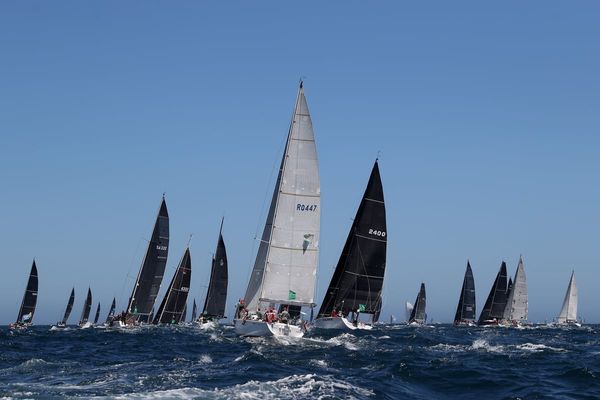
The European Commission and national consumer protection authorities last week initiated a probe into “greenwashing” by 20 airlines in the region, belling the cat on “vague or false claims” rather than accurate information on the sector’s efforts to reduce climate-damaging emissions.
Aiming to be “net-zero” by 2050, Qantas has been a leader in trying to spin its green credentials in an industry that generates 2-3% of the world’s emissions.
But pilots at the airline responsible for fuel loads on aircraft tell Crikey that outsourcing, poor aircraft and route management, and the ultra-long Sunrise projects — many of which prioritise profit over saving fuel — have undone efforts to improve fuel efficiency.
In 1990, travelling one passenger kilometre used 2.9 megajoules (MJ) of energy — in 2019, this had more than halved to 1.3MJ. But emissions continue to rise despite this improvement in energy efficiency. Airline emissions have grown faster in recent decades than emissions in the rail, road or shipping sectors. Aviation emissions in 2022 reached almost 800 megatonnes (Mt) of carbon dioxide (CO2), about 80% of their pre-pandemic level. Planes also emit nitrous oxides (NOx), the most prevalent greenhouse gas after CO2 and methane.
Despite the high pollution of the airline sector, Qantas has long made a big deal out of its green credentials. The Qantas website states the company aims to improve fuel efficiency by an average of 1.5% per annum to 2030 by “focusing on flying and engineering practice, investing in fuel-efficient aircraft, supporting broader airspace design and management initiatives requiring industry-wide collaboration and continuing to reduce fuel burn, including through smarter flight planning”.
Qantas also likes to talk up its “investments” in emissions minimisation. In May 2023, with its usual fanfare, the company “announced” a $400 million Qantas Climate Fund for direct investments in “sustainability projects and technologies”. Impressive? Not so much, as it included an already announced $290 million partnership with European aircraft maker Airbus for Sustainable Aviation Fuel (SAF), which is made from bio-feed stocks that produce far lower emissions than regular fuel. Qantas could not detail any further investments.
Airline efficiency has come from improved aircraft design and technology, larger planes that can carry more passengers, and a higher passenger load factor, which means empty seats are now less common. The latest aircraft from manufacturers Airbus and Boeing — including the B787, A350, A220 and A321neo, which are all on order by Qantas — are 20-25% more fuel efficient than their predecessors.
The European Union is exploring whether the claims that a flight’s CO2 emissions can be offset by climate projects or through the use of SAF are based on sound scientific evidence. Qantas is making such claims, stating it wants SAF to constitute 10% of its fuel by 2030 and approximately 60% by 2050.
What Qantas and other airlines aren’t saying aloud is that there are major problems with SAF, which is developed from inefficient biofuels produced from crops. For example, 1.7 kilograms of corn ethanol is needed to make 1kg (1.25L) of sustainable aviation fuel. Feedstock supply is a critical challenge for the production of SAF due to limited availability and competition from other industries and uses (food, road transport, marine fuel, petrochemicals). There is also evidence these crop-based biofuels can increase net emissions while diverting valuable cropland away from food production.
This growing debate aside, a combination of serial outsourcing, management obsession with ultra-long flights, and Qantas dragging its heels on ordering next-generation aircraft — its fleet is infamously old compared to its international competitors — is cruelling the airline’s green efforts, pilots say.
The outsourcing of all heavy maintenance for its long-haul aircraft and of some for its smaller planes offshore sees the company regularly fly large empty aircraft to Singapore, Manila and Abu Dhabi. Ground staff outsourcing in Australia has increased waiting times at gates. One international pilot told Crikey it was not uncommon to wait 90 minutes in Sydney at dawn. “This burns about two tonnes of fuel,” the pilot said.
The double-decker A380s that Qantas flies to Los Angeles regularly have 100 spare seats in economy, pilots said.
“They only fly them because the passengers want first (12 seats) and business (70 seats) class, so the fuel inefficiency per passenger is enormous. They are the heaviest planes in the sky and far less fuel efficient than the A350s or B787s,” one pilot said.
Qantas has yet to order replacement aircraft for the A380s.
Even with its newest aircraft, the A350 (deliveries are due to start later next year), Qantas is pushing the fuel consumption envelope with the airline’s massively hyped “Sunrise” direct flight from Sydney to London (and later New York and maybe Paris).
Qantas responded to detailed questions about its current route management, emissions and A380s by directing Crikey to a March 2022 presentation on climate.
“The ideal flight length for these aircraft in terms of fuel efficiency is eight or nine hours,” pilots said. Qantas is pushing them to fly up to 22 hours. “In addition to this, we have to carry extra fuel in case we have to land somewhere else for an emergency.”
“What people don’t realise is that every extra tonne of fuel we carry costs an extra half a tonne of fuel burnt. Management green spin is just a joke, it’s hypocritical.”







